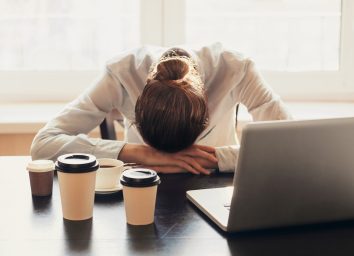Drinking This Many Cups of Coffee Per Day Is Bad For You, Experts Say

Sipping on a cup of coffee is a focal part of many people’s morning ritual. Some may even require a few cups of coffee to get their day going. Still, as is the case with most beverages and food, consuming too much of one single thing can wreak havoc on your body.
Todd Sontag, DO, a family medicine physician with Orlando Health Physician Associates, gives context as to how drinking too much of a stimulant can cause issues to arise in the body—and in interesting ways. Also, be sure to refer to 5 Side Effects of Drinking Too Much Coffee for more reasons to monitor the number of cups you drink each day.
Is it possible to have too much caffeine each day?
“The maximum recommended dose of caffeine that has been shown to be safely consumed by adults is 400 milligrams daily,” says Sontag.
For context, 400 milligrams is about four, 8-ounce cups of coffee. Any more than that can cause insomnia and even heart problems. He adds that drinking more than that habitually has been shown to cause seizures. However, for pregnant women, Sontag says the cut off should be 300 milligrams. Gil Weiss, M.D., OB/GYN Partner at Association for Women’s Healthcare has told Eat This, Not That! before that women who are pregnant should drink even less than that.
“Most experts agree that consuming less than 200 milligrams of caffeine should not have any impact on fertility,” he said.
What are the potential side effects of drinking too many cups of coffee?
“Having 400 milligrams of caffeine, or 4 cups of coffee or a little over one energy drink can cause anxiety, insomnia, and a rapid heart rate,” says Sontag. “In pregnant women, consuming 300 milligrams, or three cups of coffee, or 10 chocolate bars, or one energy drink, has been linked to increased risk of miscarriage.”
For women who are breastfeeding, Sontag also encourages cutting back on caffeine, as large amounts of the stimulant are associated with sleep issues, bowel issues, and irritability in babies.
He also points out that chronic caffeine consumption can lead to developing a tolerance, which means you could become more apt to increase the number of cups of coffee you drink. This could, in part, lead to psychological dependence.
“There are many other potential side effects, and just like with any medication or drug, you won’t know how it affects you until you try it,” says Sontag. “The 400 milligrams threshold is considered standard, but for some people, it may be much higher or lower doses that result in the undesired side effects. It has also been shown to interact with many drugs and supplements.”
At the end of the day, everyone has their own respective limit when it comes to caffeine consumption. Listen to your body and know that if you’re taking medication, make sure to check with your doctor about if caffeine negatively affects it.








